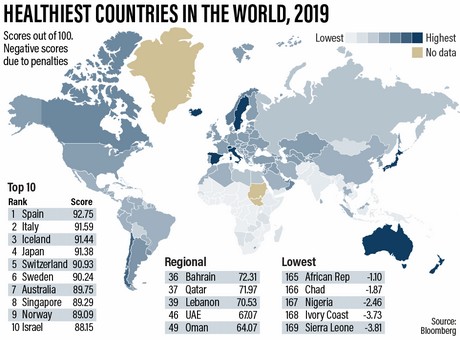No Arab nation was in the Bloomberg Healthiest Country Index’s top 35 this week, despite the region’s significant wealth. Six of the top 10 nations were European, with Spain overtaking Italy as the world’s healthiest country. Japan, Australia, Singapore and Israel made up the rest of the leading 10 nations, with less-developed countries such as Cuba making the top 30.
In the rankings, which are based on factors such as life expectancy, obesity, death rates and exercise levels, the UAE fell three places from its 2017 position, making it the 46th healthiest nation out of 169.
The highest-performing Gulf country, Bahrain, rose four places to 36th, overtaking Qatar, which fell one place to 37th. Kuwait fell by 22 places – the second-steepest drop recorded – to 78th. It tied with Saudi Arabia, which recorded a fall of six places compared with 2017.

Dr Raghib Ali, director of the Public Health Research Centre at New York University Abu Dhabi, said the findings revealed an urgent need for a better understanding of the effect of changing lifestyles: “The UAE is doing slightly less well than you might expect in this table because of high and increasing levels of heart disease, which is being driven by high and increasing levels of diabetes. That is mainly caused by obesity, a lack of physical activity and an unhealthy diet.”







